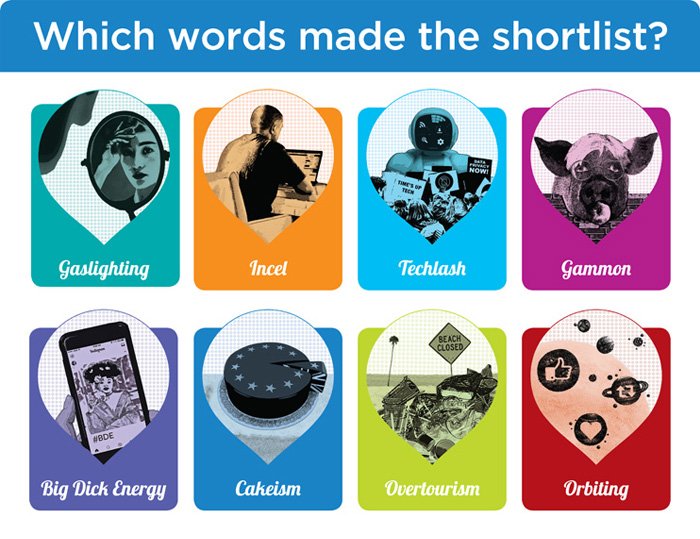Isaac Stanley-Becker, washingtonpost.com, November 16 at 5:19 AM
image from

“Toxic” was judged to “have lasting potential as a term of cultural significance."
“In 2018, toxic added many strings to its poisoned bow becoming an intoxicating descriptor for the year’s most talked about topics,” observed the online dictionary, produced by Oxford University Press.
Among the runners-up was “gaslighting.” Coined by the 1938 play “Gas Light” and later made famous by the 1944 film starring Ingrid Bergman, as Oxford said, it means “the action of manipulating someone by psychological means into accepting a false depiction of reality or doubting their own sanity.” The dictionary noted its frequent use to describe tactics employed by President Trump.
The concept has also been applied to political contexts this year, with the term used extensively of President Donald Trump; his frequent assertions that the media are spreading ‘fake news’, and implications that his administration is the sole arbiter of truth, have led to Trump’s presidency of the United States being compared to an abusive relationship.https://en.oxforddictionaries.com/word-of-the-year/shortlist-2018
Also on the shortlist was “big dick energy.” Oxford’s definition is at odds with Trump’s posture. The phrase means “an attitude of understated and casual confidence."
“Though the term has its roots in the perceived confidence of the well-endowed,” according to the dictionary, “BDE is by no means exclusive to those with male genitalia; many women, such as Rihanna, Serena Williams and Cate Blanchett, are among those identified as having this low-key, self-assured poise.”
Other options were “cakeism” — the doctrine of having one’s cake and eating it too, as Britain has been accused of doing when it comes to the nation’s vexed exit from the European Union — and “techlash.” That portmanteau describes “a strong and widespread negative reaction to the growing power and influence of large technology companies particularly based in Silicon Valley,” according to Oxford’s definition. (See, for example, this New York Times exposé.)
Oxford’s 2017 word was “youthquake,” defined as “a significant cultural, political, or social change arising from the actions or influence of young people.” In 2016, it was the ominous “post-truth.”
There was a 45 percent increase in the number of times that “toxic” was looked up on oxforddictionaries.com in 2018. The word found increasingly diverse uses, according to the dictionary, both in the adjective’s literal sense — relating to poison and likely to cause death — and its metaphorical sense — generally harmful or corrosive, as in a toxic political culture or a toxic relationship.
Among the word’s most common collates — words that accompanied “toxic” — were “masculinity,” “culture” and “air.”
The dictionary noted that toxicity was a common feature of some of the year’s most high-profile news events, from the waste seeping from the southeastern United States during hurricane season to the use of the nerve agent Novichok in an attack on a former Russian spy and his daughter in the English city of Salisbury. Air pollution was among the risks highlighted by last month’s report of the Intergovernmental Panel on Climate Change.
But the term was perhaps even more aptly applied to regressive cultural and workplace practices facing sustained scrutiny, as the #MeToo movement continued to shift expectations about gender relations and the exercise of power in the home and in industries spanning politics, technology and academia. There were walkouts at Google and resignations on Capitol Hill. A lawsuit cast a bright light on arcane, boundary-pushing interpersonal dynamics in rarefied scholarly circles.
Meanwhile, the president continued to use jarring personal attacks in his feuds with female adversaries, calling Stormy Daniels, the adult-film actress who alleges that she had an affair with Trump, “Horseface.” And the battle over the confirmation of his Supreme Court nominee, Brett M. Kavanaugh, became a melee about sexual assault and binge drinking. After “chemical,” the word “masculinity” was most often paired with “toxic,” according to the dictionary.
Dictionaries, like many institutions and individuals, have discovered this year that politically neutral ground is fast disappearing. Dictionary.com, in particular, has not been shy about responding to the news of the moment. On Thursday, the online dictionary appeared to scold a writer from the Washington Examiner who had called Alexandria Ocasio-Cortez, the liberal firebrand and Democratic congresswoman-elect, a “girl” in a tweet accusing her of hypocrisy for wearing decent clothes to work.
The dictionary has previously taken to social media to correct the president’s prolific spelling and diction errors, observing that online searches were skyrocketing for the words in his eyebrow-raising tweets.



No comments:
Post a Comment